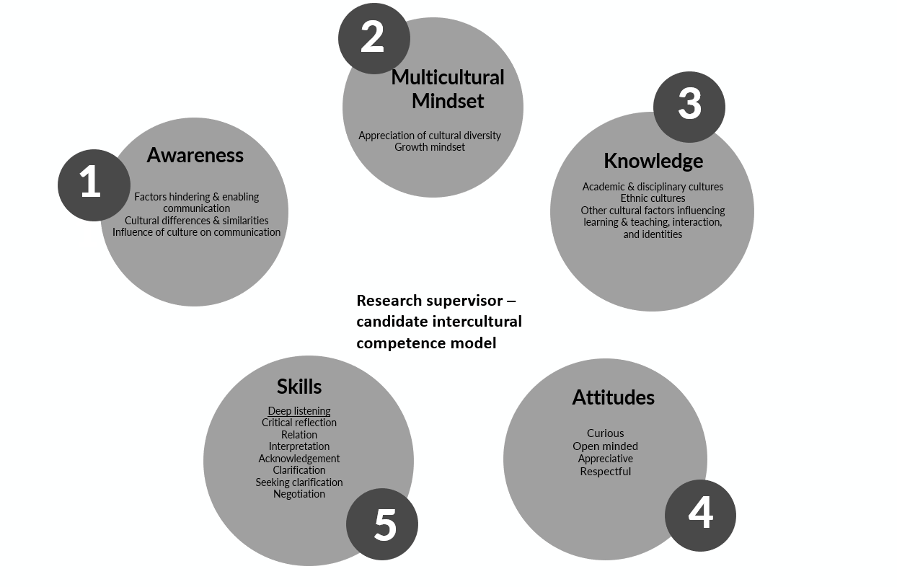
Intercultural communication between PhD supervisors and candidates

You may also like
The increasing diversity of PhD types and cohorts highlights that doctoral study is an intercultural space where researchers from different backgrounds and pathways interact. Supervision provides an environment for practising and enhancing intercultural competence in online and in-person communication.
Worldwide, discussions around intercultural supervision have focused mainly on interactions between supervisors who are native speakers of English and international students. However, culture goes beyond national origin to encompass religious, gender, disciplinary and community affiliations. So any interaction and relationship between supervisors and supervisees is, in fact, intercultural. For example, an exchange between a Chinese supervisor and an Australian candidate is considered intercultural, as is an interaction between an Australian Catholic male supervisor and an Australian Buddhist female supervisee.
- Resource collection: advice for surviving your PhD dissertation
- Read more: ‘I’ve been a research supervisor for 35 years and I’m still learning’
- How to foster PhD excellence
If the relationships between supervisors and supervisees do not acknowledge these intercultural aspects – and manage them effectively – this can negatively impact academic performance, satisfaction and timely completion.
What are the common intercultural challenges?
Interactions between supervisors and candidates occur in formal and informal contexts, such as feedback-giving sessions, small talks or research discussions. Misunderstanding can occur for many reasons, including language competency, communication style and cultural conceptualisations.
Supervisors and candidates may encounter challenges in comprehending each other’s accents, word choices or sentence complexity. These challenges will lead to misunderstandings and misperceptions of each other. More often, if a candidate is from a non-English-speaking background, they are likely to lack confidence in their language proficiency, while the reality is that communication is a two-way street. Each speaker has their own identity and ways of expressing themselves using diverse resources, including languages and codes.
Another challenge is differences in style. These will be reflected in aspects that include using different terms of address, casual versus formal ways of communication, brief versus detailed information, and learning and teaching styles. Supervisors may prefer a learning and teaching style that is not necessarily familiar to candidates.
Cultural conceptualisations are important because we rely on them to make sense of an interaction, a person, an event or a place based on our knowledge, information and experience. For example, a supervisor can be conceptualised as a guide, teacher, mentor, colleague or co-learner, and a candidate as a follower, apprentice or colleague. These conceptualisations may not reflect our current doctoral education context, which redefines the roles and relationships of supervisors and supervisees. When there is a mismatch in the conceptualisation of roles, misunderstanding will occur.
Supervisor-candidate intercultural communication model
As supervision is an intercultural space, supervisors and candidates need to attempt to acquire and enhance their competence to understand each other better, avoid assumptions and stereotypes, build rapport and openly and effectively discuss with each other. Below is a recommended model, based on Byram (2020) and Sharifian (2013), that emphasises five domains crucial to successful intercultural communication in supervision: awareness, multicultural mindset, knowledge, attitudes and skills.

So, how do we ensure better supervisor-candidate communication?
- Be aware of the factors that hinder and enable communication between supervisor and doctoral candidate. These include differences and similarities, and the extent to which culture influences communication. Awareness of cultural differences is not meant to create cultural distance but rather to help minimise assumptions and motivate negotiation in interaction.
- Have a multicultural mindset. This means appreciating and showing genuine interest in linguistic and cultural diversity, acknowledging that our cultural conceptualisations are enriched with each interaction, and recognising that our communication skills will improve. We do not need to be multilingual to have a multicultural mindset.
- Have a good understanding of academic and disciplinary cultures outside our own and of each other’s ethnic cultures as well as other factors such as gender, religion, identities and professional background. Our layers of culture influence how we talk, write and interact, so knowledge about these cultural factors – including what and why – will help us to minimise assumptions and judgement.
- Be open-minded, appreciative, respectful and curious about each other’s cultures. This attitude helps to build trust and rapport between supervisors and candidates. Negative stereotypes about each other can significantly hinder communication between supervisors and candidates because patience and willingness to try will be minimal. Therefore, when supervisors are interested in, appreciate and respect candidates’ cultures, candidates feel empowered. A simple act might be trying to pronounce each other’s names correctly.
- Practise different intercultural communication skills. When it comes to communication, we usually focus on speaking. Listenership is, however, equally important. Mindful listening without judgement helps us deeply understand each other’s ideas. As supervisors and candidates will not share all cultural aspects, clarifying and seeking clarification are crucial.
- Practise critical reflection regularly. We are expected to explicitly acknowledge that no matter how much we try to understand each other, we are still learning, and mistakes can occur.
Training is needed to develop intercultural competence
Despite the influence that intercultural relationships have on interactions between supervisors and candidates, research training and supervisor development programmes have not yet implemented intercultural competence training effectively. This issue must be addressed, especially since doctoral education at a distance is becoming more popular. Training should occur during the candidates’ orientation sessions and the supervisors’ professional development workshops. Universities could introduce workshops, self-directed learning modules and forums for supervisors and candidates to exchange and support each other and improve intercultural communication skills. These skills are not just necessary in the supervision space. They are essential in working with research and industry partners, at work and in daily life.
Thuy Dinh is research, curriculum and learning coordinator (researcher development) in the Office of the Deputy Vice-Chancellor and vice-president (research, enterprise and global) at the Western Sydney University, Australia.
If you would like advice and insight from academics and university staff delivered direct to your inbox each week, sign up for the Campus newsletter.


